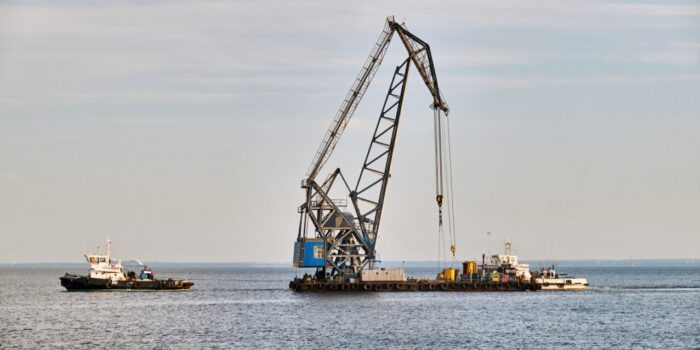Course for operating floating cranes
At KURSO, we are engaged in the provision of specialised courses for the operator of floating cranes. We have many years of experience in organising classes to prepare you to become an operator of various types of industrial equipment, including those used in ports or shipyards. We offer a set of training courses in accordance with UDT requirements, conducted by qualified specialists. Taking advantage of our services is a guarantee of passing the vocational exam and finding a job in the profession.
Floating crane training
Our training courses are aimed at those wishing to gain the technical, theoretical and practical knowledge required to become a floating crane operator. The course programme includes:

- General knowledge of floating cranes and their types,
- technical supervision issues and UDT requirements,
- maintenance and care activities for floating cranes,
- operation of the crane and the tasks of its operator,
- operation of loading equipment,
- health and safety rules.
Classes are taught by a staff of specialised lecturers with extensive experience and the broad knowledge needed to teach both theory and practice. We therefore provide comprehensive professional preparation in accordance with UDT guidelines. The course concludes with a state examination, the requirements of which we explain in detail during the classes.
Requirements to join the course:
- at least 18 years of age,
- a certificate of occupational medicine that you are fit to practise this profession,
- at least primary education.
What are floating cranes?
Floating cranes are a type of crane used in ports or shipyards. They are special equipment used for work on water, where other types of machinery would not be used. Floating cranes are placed on platforms, sometimes in the form of pontoons. The differences between the various types of these machines, as well as other cranes used in the shipbuilding industry, are mainly in the technical specifications. They can be self-propelled - which is the most common - or use special tugs for movement.

Floating cranes - subdivision
By the type of arm you have:
- swivel - equipped with a cargo deck,
- with fixed arm - can only move the load back and forth and raise and lower it.
Other parameters that distinguish specific types of floating cranes are:
- Load capacity [t],
- lifting speed [m/min],
- speed of boom change [m/min],
- rotation speed [1/min],
- the speed at which the crane moves [m/min],
- maximum reach [m],
- maximum lift height [m].
Questions and answers
Where do floating crane operators work?
After taking the course, passing the exam and obtaining the UDT licence, an operator prepared to work with floating cranes should easily find employment in ports and shipyards.
What is a floating crane operator course like?
The courses are designed to introduce the theoretical and practical knowledge required to operate the equipment correctly. Our trainers prepare the trainees on the operation of floating cranes, their technical specifications, as well as the principles of occupational safety.


